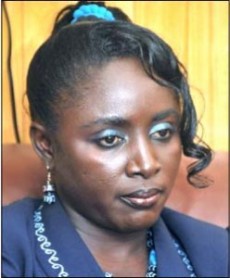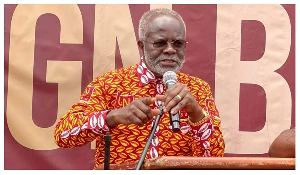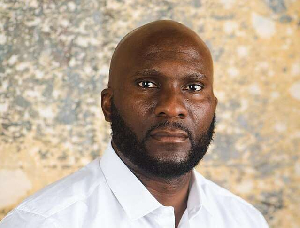A lot of reactions have been raised after Hannah Bisiw; the deputy minister of Water Resources, Works and Housing (http://www.ghanaweb.com/GhanaHomePage/NewsArchive/artikel.php?ID=173188) demanded on a TV show that she be addressed by her academic titles.
What bothers me is why a person with a ministerial post in government would demand in public that she be addressed by her academic title. Many on Say It Loud (SIL) have argued that Hannah Bisiw has earned her title and thereby has the right to demand that she be addressed accordingly if she so desires. The question is does she become more intelligent and productive as a minister if she is addressed as Dr. Minister, Miss/Mrs Hannah Bisiw? On the other hand would she lose her senses (like it appears she did on TV) and thereby lose her thinking cap and become irrational and ineffective in her duties as a minister if she is not addressed as Dr. whatever? Is it her deeds and competence as an individual in whatever she has done previously that made her be recognised by the President as a minister or was she appointed based on the mere fact that she has earned herself a PhD?
Someone accused me on SIL of being jealous of her probably because I do not have a PhD. Of course I do not have a PhD but to be jealous of her for that reason is far fetched. I have met many Professors and PhD holders some of whom I wouldn't want to meet a second time or have in my home because of their narrow mindedness. What worth are academic titles of today when they can be bought?
The kinds of Hannah Bisiw are dangerous to the development of our country and are destructive role models for the younger generation. Whilst it is important that we recognise hard working academics and give them the respect due them, the recognition and respect should not be earned through titles but by deeds. Ghanaians often do, by default perceive academic titles as superior and employers tend to put academic title holders in higher positions instead of people with the right competence. This logical fallacy has more often than not been one of the setbacks of our development simply because we put square pegs in round holes.
We need highly trained and qualified professionals if we should keep abreast with modern pace of development. The speed at which the world is developing calls for every country to invest heavily in education and the higher the level of training the better our country can reap benefits. Whilst we are investing in the training of highly qualified professionals, we need to emphasise more on the output of these professions and not what titles they attain. What is interesting to society is the added value of their acquired knowledge to the development of business and welfare and not what titles they acquire after their trainings. I am of the belief that the obsession of titles by leaders and people of influence would give a wrong impression to young people as to why they should attain higher academic qualifications. What these egocentric types of leaders might be promoting to young people is the “chew and pour” practice which at the end of the day is destructive and unviable for the individual and society. It is not a hidden secret that some of our so called highly trained academics with big titles never fit into their so called professions when they find themselves in societies where output is valued more than titles. In societies like those of the Scandinavia where what you can produce is more important and valuable than what title you carry, the benefit of this type of perception and practice has multiple benefits to the development of these societies. An atmosphere of mutual respect is created between leadership and subordinates in these countries where all and sundry are recognised as important and inevitable parts of the whole. Putting square pegs in round holes is avoided since what determines a position is not an academic title but deed. This does not preclude the fact that high academic and professional qualifications are underlying pre-requisites. This type of perception in my view encourages aspiring professionals to concentrate on the practical aspects of their professions rather than the “chew and pour” tradition since the notion that a title would give a position is discarded.
Sweden has over the years seen cabinet ministers who never had post secondary formal education. The former Swedish minister of finance (1999 – 2004), Bosse Ringholm, left high school before graduation for fear of not getting passed marks in Maths and English (http://sv.wikipedia.org/wiki/Bosse_Ringholm ). The current Swedish minister for the European Union (EU) and nominee for the position of EU commissioner for Internal, Migration and Police affairs is a PhD holder in political science yet has never been addressed in public as a Dr. nor demanded to be addressed as such. Does that make her less of a competent minister than Hannah Bisiw? What would Hannah be demanding if and when she is made a cabinet minister? I guess she might carry a PhD banner on her forehead so no can mistake her for being a hard earned PhD holder. We need devoted hardworking and intelligent leaders and not leaders who dwell on academic titles.
What sense of responsibility is the deputy minister of water resources portraying when to poor people out there who do not have good running water to drink? What good is her PhD if the best she can do with it is to demand that it be pronounced loud and clear in demonstration of hollow achievement when children are dying of thirst, hunger and diseases in Ghana? Proud as the deputy minister is with her academic laurels, the President should send her to the classroom or a research institute where academics are needed the most.
Ghana needs a new breed of leaders who would encourage young people to strive for higher education with the aim of becoming excellent in their professions of choice and not what titles they can boast of. We need leaders who would demonstrate to the young their desire to bring about sustainable development and make a difference in the lives of the suffering masses. What our leaders have to portray is that fact that every member of our society irrespective of level of education has a role to play. Let Ghana be the first country in Africa to do away with academic titles, with the exception of professional and traditional titles which are clearly part and parcel of the profession or office one holds.
Kojo Ansah-Pewudie
Gothenburg, Sweden
kojo@ansah-pewudie.com
Opinions of Friday, 11 December 2009
Columnist: Ansah-Pewudie, Kojo
The Essence of Academic Titles















